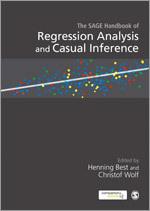The SAGE Handbook of Regression Analysis and Causal Inference
Welcome to the companion website for The SAGE Handbook of Regression Analysis and Causal Inference by Henning Best and Christof Wolf.
This website is under construction – the full site will be available on the Handbook’s publication.
'The editors of the new SAGE Handbook of Regression Analysis and Causal Inference have assembled a wide-ranging, high-quality, and timely collection of articles on topics of central importance to quantitative social research, many written by leaders in the field. Everyone engaged in statistical analysis of social-science data will find something of interest in this book.'
John Fox, Professor, Department of Sociology, McMaster University
'The authors do a great job in explaining the various statistical methods in a clear and simple way - focussing on fundamental understanding, interpretation of results, and practical application - yet being precise in their exposition.'
Ben Jann, Executive Director, Institute of Sociology, University of Bern
'Best and Wolf have put together a powerful collection, especially valuable in its separate discussions of uses for both cross-sectional and panel data analysis.'
Tom Smith, Senior Fellow, NORC, University of Chicago
Edited and written by a team of leading international social scientists, this Handbook provides a comprehensive introduction to multivariate methods. The Handbook focuses on regression analysis of cross-sectional and longitudinal data with an emphasis on causal analysis, thereby covering a large number of different techniques including selection models, complex samples, and regression discontinuities.
Each Part starts with a non-mathematical introduction to the method covered in that section, giving readers a basic knowledge of the method’s logic, scope and unique features. Next, the mathematical and statistical basis of each method is presented along with advanced aspects. Using real-world data from the European Social Survey (ESS) and the Socio-Economic Panel (GSOEP), the book provides a comprehensive discussion of each method’s application, making this an ideal text for PhD students and researchers embarking on their own data analysis.
Disclaimer:
This website may contain links to both internal and external websites. All links included were active at the time the website was launched. SAGE does not operate these external websites and does not necessarily endorse the views expressed within them. SAGE cannot take responsibility for the changing content or nature of linked sites, as these sites are outside of our control and subject to change without our knowledge. If you do find an inactive link to an external website, please try to locate that website by using a search engine. SAGE will endeavour to update inactive or broken links when possible.

